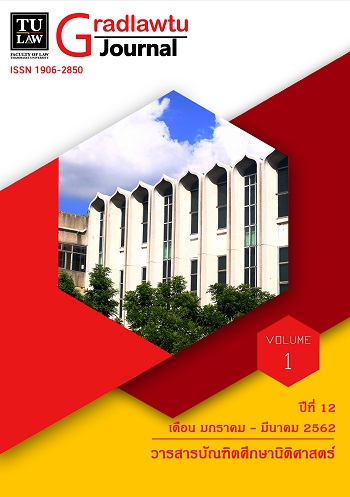การป้องกันโดยชอบด้วยกฎหมาย:ศึกษา กรณีบุคคลถูกทำร้ายอย่างต่อเนื่อง
คำสำคัญ:
บุคคลถูกทำร้ายอย่างต่อเนื่อง, การป้องกันโดยชอบด้วยกฎหมาย, ภยันตรายที่ใกล้จะถึงบทคัดย่อ
อาการทางจิตวิทยาของบุคคลที่ถูกทำร้ายอย่างต่อเนื่อง อธิบายด้วยทฤษฎีวงรอบของความรุนแรง 3 ระดับ ระดับที่หนึ่ง ระดับการก่อร่างความตึงเครียด เริ่มต้นด้วยลักษณะการใช้คำพูดด่ากันมีการทำร้ายร่างกายเล็กน้อย ซึ่งระดับความตึงเครียดเพิ่มขึ้นเรื่อย ๆ ระดับที่สอง คือระดับการใช้กำลังทำร้ายโดยความรุนแรง ผู้ทำร้ายจะระเบิดความรุนแรงออกมาโดยไม่สามารถควบคุมได้ ระดับวงรอบที่สาม การแสดงความเสียใจต่อความรุนแรงที่ทำลงไป แสดงอาการสุขุมลงและแสดงความรักและกล่าวคำขอโทษโดยสัญญากับผู้ถูกทำร้ายว่าจะไม่ทำร้ายโดยใช้ความรุนแรงอีกครั้ง ทำให้ผู้ถูกทำร้ายอย่างต่อเนื่องตกอยู่ในสภาวะ “การเรียนรู้การหมดหนทางช่วยเหลือ” (Learned helplessness)ทำให้แรงจูงใจในการตอบโต้ของผู้ถูกทำร้ายลดลง ก่อให้เกิดความเชื่อในทางลบ ว่าการใช้กำลังในการตอบโต้อย่างรุนแรงต่อผู้ที่ทารุณกรรมเพื่อไม่ให้ถูกทำร้ายอีก เป็นทางเลือกที่ดี
การอ้างว่าใช้กำลังป้องกันตัวเองล่วงหน้าของบุคคลที่ถูกทำร้ายอย่างต่อเนื่อง เพราะถูกทำร้ายทั้งทางร่างกาย อารมณ์ จิตใจ ทางเพศ ถูกคุกคามด้วยวิธีอื่นใด หรือข่มขู่ให้กลัวว่าจะทำร้ายต่อชีวิต ร่างกาย จึงกระทำการตอบโต้ด้วยความรุนแรงรวมถึงการใช้อาวุธตอบโต้บุคคลที่ทำร้ายในขณะที่เกิดภยันตราย หรือขณะที่ภยันตรายได้ผ่านพ้นไปแล้ว หรือขณะที่ยังไม่เกิดภยันตราย จะถูกตั้งข้อหาจากการกระทำความผิดกรณีใช้กำลังทำร้ายจนเป็นเหตุให้ผู้ถูกทำร้ายได้รับอันตรายแก่กาย หรือได้รับอันตรายถึงแก่ชีวิต ซึ่งหากบุคคลที่ถูกทำร้ายอย่างต่อเนื่องอ้างว่าการกระทำดังกล่าวกระทำเพื่อป้องกันตัวเอง กฎหมายไทยไม่เปิดช่องให้ทำได้ ด้วยเหตุนี้จึงทำการศึกษาคำพิพากษาศาลฎีกา เพื่อให้ทราบถึงการพิจารณาคดีบุคคลถูกทำร้ายอย่างต่อเนื่องของศาลไทย กรณีจำเลยยกข้ออ้างในการกระทำตอบโต้ว่าได้กระทำการป้องกันโดยชอบด้วยกฎหมาย
เอกสารอ้างอิง
ทวีเกียรติ มีนะกนิษฐ. คำอธิบายกฎหมายอาญา ภาคทั่วไป. พิมพ์ครั้งที่ 18. กรุงเทพมหานคร : วิญญูชน, 2560.
หยุด แสงอุทัย. กฎหมายอาญาภาค 1. พิมพ์ครั้งที่ 21. กรุงเทพมหานคร : สำนักมหาวิทยาลัยธรรมศาสตร์, 2556.
BOOK AND BOOK ARTICLES
Karen Dubinsky and Franca Iacovetta. “Murder, Womanly Virtue, and Motherhood: The Case of Angelina Napolitano. 1911-1922”. Canadian Historical Review 72 (1991).
Matthew Fine. “Hear Me Now: The Admission of Expert Testimony on Battered Women's Syndrome — An Evidentiary Approach”, William & Mary Journal of Women and the law. Vol 20. Issue 1, Article 10. (2013).
Victoria law reform commission. Defences to Homicide : Final Report. (Victorian Law Reform Commission: Melbourne, 2004).
สื่ออิเล็กทรอนิกส์
ศิพร โกวิท. “เธอฆ่าสามี:Battered Woman Syndrome กับความรับผิดอาญาตามกฎหมายไทย”. https://www.gotoknow.org /posts/521950, 13 ธันวาคม 2560.
ดาวน์โหลด
เผยแพร่แล้ว
ฉบับ
ประเภทบทความ
สัญญาอนุญาต
บทความหรือข้อความคิดเห็นใด ๆ ที่ปรากฏในวารสารบัณฑิตศึกษานิติศาสตร์เป็นความรับผิดชอบของผู้เขียนบทความโดยเฉพาะ คณะนิติศาสตร์ มหาวิทยาลัยธรรมศาสตร์ และกองบรรณาธิการไม่จำเป็นต้องเห็นด้วย



